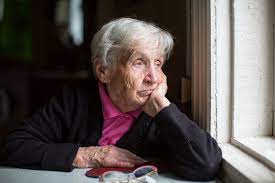Aging is an inevitable journey that everyone embarks on, yet the path is often strewn with challenges that are either overlooked or underestimated. As we age, our needs, abilities, and perspectives shift, bringing to light issues that may not have been apparent in our younger years. This blog post looks at the often-ignored struggles associated with getting older, offering insights for both the young and the old.
Sunday, December 10, 2023
The Overlooked Challenges of Aging
Aging is an inevitable journey that everyone embarks on, yet the path is often strewn with challenges that are either overlooked or underestimated. As we age, our needs, abilities, and perspectives shift, bringing to light issues that may not have been apparent in our younger years. This blog post looks at the often-ignored struggles associated with getting older, offering insights for both the young and the old.
Sunday, February 19, 2023
Ageism: How it affects us, but especially in the healthcare system
He proceeded to give me samples of medicine that I had already told him did not work for me. He refused to listen and dismissed my concerns. He patronized me and made me very angry.
After this, I became very aware of how I was being talked to or treated by anyone who was providing me a service. I educated myself on ways to combat this type of discrimination and I suggest you do the same. It is harmful to be so disrespected and dismissed.
Ageism is a type of discrimination that occurs when someone is treated differently based solely on their age. This discrimination can take many forms, from assumptions about an older person's abilities to outright refusal to provide care or services. Ageism is harmful and can have negative impacts on the physical and mental health of older individuals, especially in the healthcare setting.
Examples of Ageism
Ageism can take many forms, some of which may not be immediately apparent. Here are some examples of ageism that older individuals may face:
Assuming that someone is incapable or has cognitive decline based solely on their age
Making negative comments or jokes about older individuals or aging in general
Refusing to hire or promote someone based solely on their age
Offering medical treatment or care based solely on an individual's age rather than their medical needs
Assuming that older individuals are not interested in technology or new experiences
Assuming that older individuals are not sexually active or interested in intimacy
How Ageism Affects Older Patients in Healthcare
This discrimination can have severely negative impacts on older patients in the healthcare setting. Here are some examples of how this works:
Ageism can lead to a lack of quality care, as healthcare providers may make assumptions about an older patient's health status or medical needs based solely on their age.
Older patients may be less likely to seek care if they feel that their healthcare provider is dismissive or uninterested in their concerns.
Ageism can lead to a lack of access to medical treatments and procedures that could benefit older patients, as healthcare providers may make assumptions about an older patient's ability to recover or tolerate certain treatments based solely on their age.
Ageism can lead to a lack of trust in the healthcare system, as older patients may feel that their healthcare providers do not value or respect them.
How to Combat Ageism
Combatting discrimination such as this is an important step in creating a more equitable and just society for people of all ages. Here are some ways that individuals and organizations can combat ageism:
Educate oneself about ageism and its impacts on individuals and society.
Speak out against ageist comments or behaviors, and encourage others to do the same.
Advocate for policies and practices that support the health and well-being of older individuals.
Promote intergenerational connections and opportunities for older individuals to engage with their communities and share their knowledge and experiences.
Be mindful of ageist assumptions and stereotypes, and challenge them when they arise.
Ageism is a harmful form of discrimination that can have severe negative impacts on the health and well-being of older individuals, especially in the healthcare setting. By educating oneself, speaking out against ageism, advocating for policies and practices that support older individuals, promoting intergenerational connections, and being mindful of ageist assumptions and stereotypes, individuals and organizations can combat ageism and create a more just and equitable society for people of all ages.
Here are a few news articles that support these statements.
Feel free to read them and educate yourself on ways to protect yourself when necessary.
"Care Disparities Across the Health Care Continuum for Older Adults: Lessons From Multidisciplinary Perspectives"
"‘They Treat Me Like I’m Old and Stupid’: Seniors Decry Health Providers’ Age Bias"
"Ageism And Discrimination Against The Elderly"
"Discrimination in old age: multiple, cumulative and on the increase"
"In-depth: Why more older adults say they face age discrimination in the workplace"Staying Fit After 50
You know, a lot of folks get exercise all wrong as they age. It's like they just stop altogether, thinking it's the right thing to ...

-
You know, a lot of folks get exercise all wrong as they age. It's like they just stop altogether, thinking it's the right thing to ...
-
Retirement is a time of life when many individuals seek to embrace new adventures, broaden their horizons, and enjoy the fruits of their lab...
-
Intergenerational living isn't just a buzzword; it's a vibrant lifestyle choice that's gaining traction across the country. Pict...











.jpg)




